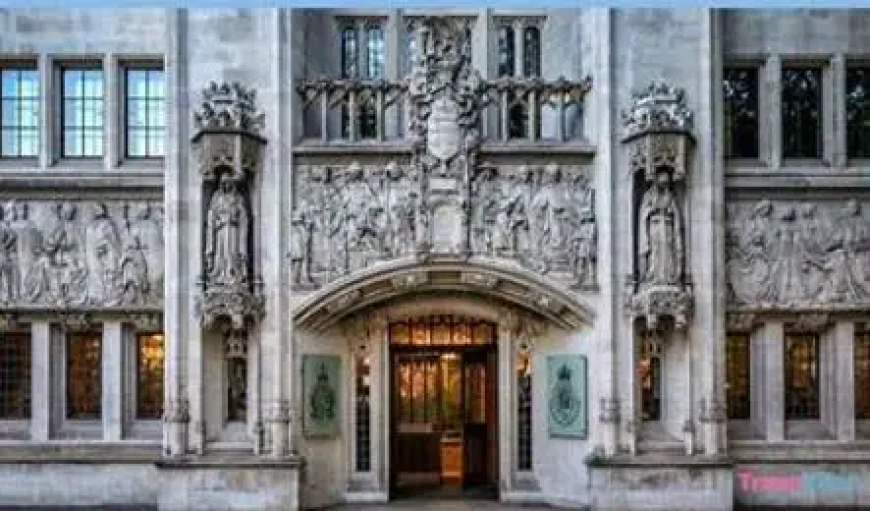Excitement as UK Supreme Court backs biological definition of woman

In a landmark ruling that signaled victory for women and setback for trans-gender people, judges at the UK Supreme Court, yesterday, unanimously ruled that a woman was defined by biological sex not ideology under the UK’s equalities law.
The judgment marked the culmination of a long-running legal battle which could have major implications on how sex-based rights apply across Scotland, England and Wales and followed a case brought against the Scottish government by a campaign group, For Women Scotland.
The group argued for a “common sense” interpretation of the words man and woman, telling the court that sex is an “immutable biological state”.
The group had maintained that sex-based protections should only apply to people that are born female.
However, the Scottish government argued in court that transgender people with a gender recognition certificate (GRC) are entitled to the same sex-based protections as biological women, adding that obtaining a GRC amounts to a change of sex “for all purposes”.
The Supreme Court was asked to decide on the proper interpretation of the 2010 Equality Act, which applies across Britain, whether the word “sex” means biological sex, or legal, “certificated” sex as defined by the 2004 Gender Recognition Act.
Delivering the judgment, Lord Hodge said the central question was how the words woman and sex are defined in the legislation.
He told the court: “The unanimous decision of this court is that the terms woman and sex in the Equality Act 2010 refer to a biological woman and biological sex.
“But we counsel against reading this judgement as a triumph of one or more groups in our society at the expense of another, it is not,” and stressed that the law still gives protection against discrimination to transgender people.
He added that the legislation gives transgender people “protection, not only against discrimination through the protected characteristic of gender reassignment, but also against direct discrimination, indirect discrimination and harassment in substance in their acquired gender”.
The Equality Act provides protection against discrimination on the basis of various characteristics, including “sex” and “gender reassignment”.
Speaking outside the Supreme Court following the ruling, For Women Scotland co-founder, Susan Smith said: “Today, the judges have said what we always believed to be the case, that women are protected by their biological sex.
“Sex is real and women can now feel safe that services and spaces designated for women are for women and we are enormously grateful to the Supreme Court for this ruling.”
First Minister, John Swinney, said the Scottish government accepted the judgement.
He posted on social media: “The ruling gives clarity between two relevant pieces of legislation passed at Westminster. We will now engage on the implications of the ruling.”
Swinney added: “Protecting the rights of all will underpin our actions.”
A Scottish government spokesperson insisted ministers had acted in good faith during the legal proceedings, and noted that the Equality and Human Rights Commission, EHRC, was updating its guidance in response to the judgement.
A UK government spokesman said the ruling would bring “clarity and confidence for women and service providers such as hospitals, refuges, and sports clubs”.
“Single-sex spaces are protected in law and will always be protected by this government,” the spokesman added.
Conservative leader, Kemi Badenoch, described the ruling as a “victory for all of the women who faced personal abuse or lost their jobs for stating the obvious”.
She added: “It’s important to be reminded the court strongly and clearly re-affirmed the Equality Act protects all trans people against discrimination, based on gender reassignment, and will continue to do
Harry Potter author JK Rowling posted on social media: “It took three extraordinary, tenacious Scottish women with an army behind them to get this case heard by the Supreme Court and, in winning, they’ve protected the rights of women and girls across the UK.”
Meanwhile, Charity Scottish Trans said it is really shocked by the outcome of the Supreme Court case.
Manager Vic Valentine said the judgement “reverses twenty years of understanding on how the law recognises trans men and women with Gender Recognition Certificates.
Trans people need to be able to recover on hospital wards, use toilets, go swimming and access services just like anyone else,” they add.
“This judgement seems to suggest that there will be times where trans people can be excluded from both men’s and women’s spaces and services.
“It is hard to understand where we would then be expected to go – or how this decision is compatible with a society that is fair and equal for everybody.”
The campaigner says Scottish Trans will continue pushing for trans people to be able to “get on with our lives with privacy, dignity and safety”.
A transgender woman is someone registered male at birth, but who identifies as a woman; while a transgender man is someone registered female at birth, but who identifies as a man. Trans is a shorter way of saying transgender.

 admin
admin 


